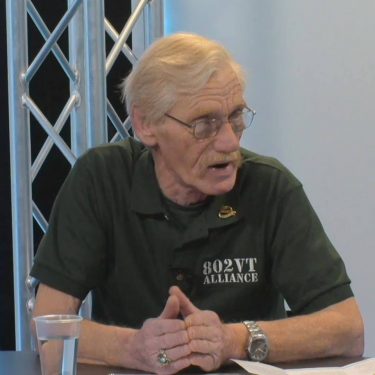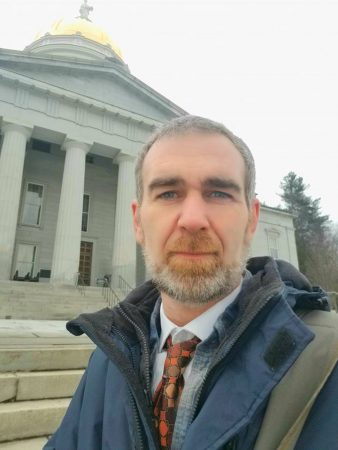Attorney General T.J. Donovan’s decision to challenge a rollback of California’s greenhouse gas emission and fuel economy standards by the Trump administration has prompted a rebuke from Vermont activists.
As a result of Donovan’s action, Vermont is joining 22 states, the District of Columbia, and New York City and Los Angeles in a lawsuit against the U.S. Department of Transportation and the National Highway Traffic Safety Administration (NHTSA).

Multiple states and cities are suing the federal government to protect their efforts to set emissions standards higher than those set at the federal level.
Donovan, along with other Democratic attorneys general and climate-change activists, argue that California’s greenhouse gas emission standards will dramatically reduce emissions from automobiles and trucks.
Individuals named in the Blue State-led lawsuit include Elaine Chao, secretary of the Department of Transportation, and James Owen, acting administrator of the National Highway Traffic Safety Administration (NHTSA).
“The climate crisis is affecting Vermonters right now. Vermont’s ability to limit how greenhouse gases enter our environment, like we do with our vehicle emission standards, is a vital tool in the fight against climate change, Donovan said in a news release about the legal challenge.
“Vermont has always been a national leader in clean air. We remain committed to fight for our environment and for clean air by opposing this action by the federal government.”
The Attorney General’s Office argues that NHTSA lacks legal authority to roll back California’s standards and that doing so is contrary to a 2007 ruling that rejected a challenge to Vermont’s initial greenhouse gas regulations in Green Mountain Chrysler Plymouth Dodge Jeep v. Crombie.
But pushback to Donovan has come from two conservative and libertarian leaders who have developed grassroots coalitions of carbon-tax opponents and Second Amendment activists.

John de Bruin: “The implementation of California-style emission laws would be a financial disaster for a state with the cleanest air quality.”
The citizens’ group 802VT Alliance, headed by founder John de Bruin of Danby, is opposed to the lawsuit.
The group wants to restore constitutional control at all levels of government as well as support candidates who espouse “smaller government” principles.
“The adoption of California-style auto rules would make cars unaffordable for most Vermonters who depend on private transportation for everything,” de Bruin told True North. “Since there is no mass transit, Vermonters would be forced to give up their lifestyles and/or jobs. The implementation of California-style emission laws would be a financial disaster for a state with the cleanest air quality. My opinion is that this (class action lawsuit) is just another part of the climate change hoax being pushed by the left.”
Newberry resident JT Dodge, who heads up the nonpartisan group No Carbon TAX Vermont, also strongly opposes Donovan and the lawsuit. Earlier this year, Dodge led a boycott against seven Vermont companies whose CEOs have publicly supported a state carbon tax. In 2018, he was blocked from posting on Gov. Phil Scott’s Facebook page.
Dodge claims several state legislators with links to “green” companies have a conflict of interest when it comes to climate-change policies being debated in Montpelier. He also says overly struck emissions standards don’t work.
“Activism in emission-setting standards creates costly expensive vehicles,” he told True North. “When vehicle manufacturers have more than one standard that they are required to meet, they have to follow the stricter version or begin to produce two versions or more of every vehicle. Having two or more versions of every vehicle would make the price of vehicles go through the roof.”

JT Dodge: “California has a history of activism around fuel-economy standards; a sudden shift to a standard requiring fully electric vehicles, for example or some other drastic idea, could seriously damage our vehicle manufacturers in the USA.”
Dodge said creating strict standards that change year-to-year guarantees vehicles will be increasingly unaffordable for future prospective consumers.
“The average cost of a vehicle should, and could, stabilize to more affordable levels if vehicles met more prudent universal-fuel economy standards,” he said. “California has a history of activism around fuel-economy standards; a sudden shift to a standard requiring fully electric vehicles, for example or some other drastic idea, could seriously damage our vehicle manufacturers in the USA.”
Dodge says that heavy handed standards, such as those in California, would make vehicles too expensive for Vermont consumers in the long run. As a result, auto makers and their dealers would be unable to move inventory without some kind of a substantial tax subsidy.
“[Adopting the stricter standards] would equate to an industry bail-out,” Dodge said. “I know from the perspective of being a rural Vermonter, it’s a challenge to afford a quality vehicle, but it’s an absolute necessity. Vehicle manufacturers and vehicle owners simply can’t afford to have activists in control of the nation’s vehicle fuel economy standards. Standards presented in this way will create an environment that puts ongoing downward pressure on vehicle sales.”
The NHTSA’s view is that California’s greenhouse gas emission standards, which have been adopted by Vermont and 11 other states, are preempted by federal law.
Lou Varricchio is a freelance reporter for True North Reports. Send him news tips at lvinvt@gmx.com.


